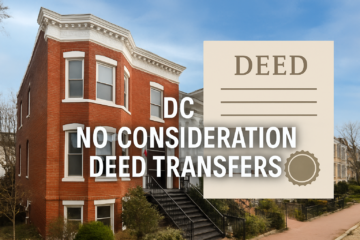Navigating the world of deed transfers can be quite a puzzle, especially for first-timers. It’s easy to stumble upon mistakes that can complicate the process. However, with an online notary from Gentile Property Law Office by your side, you can steer clear of these common pitfalls. Let’s explore how an online notary can help ensure a smooth and successful deed transfer.
1. Overlooking the Importance of Notarization
Many people underestimate the crucial step of having deeds notarized. A notary ensures that all parties involved are verified and documents are legally binding. It’s not merely a formality; it’s a safeguard against potential fraud and unauthorized transactions. By using Gentile Property Law Office, you can easily arrange notarization from the comfort of your home, ensuring all signatures are securely verified without the hassle of in-person appointments.
The convenience of an online notary cannot be overstated. With the rise in virtual services, having your deeds notarized online doesn’t just save time but also adds a layer of security. Gentile Property Law Office verifies digital platforms to confirm identity and authenticate documents, reducing the chance of errors or fraudulent activities. Remember, a deed without notarization could be contested or deemed invalid in legal proceedings, thereby complicating ownership rights and responsibilities.
2. Incomplete or Incorrect Documentation
Inaccurate documentation is one of the most common errors encountered in deed transfers. Details like names, property descriptions, and legal terms must be precise. An online notary plays a pivotal role here, meticulously reviewing each section to ensure all information is accurate and complete before finalizing the transaction. This attention to detail prevents potential disputes or delays that might arise from errors that go unnoticed during initial inspections.
3. Ignoring State-Specific Requirements
Each state governs deed transfers with a unique set of rules and requirements that can vary widely. What holds in one jurisdiction may not be valid in another. For instance, certain states have additional stipulations regarding tax disclosures or legal frameworks that must be adhered to during property transactions. By consulting an experienced online notary, such as can be found at Gentile Property Law Office, you gain access to expertise that ensures compliance with these regulations, averting potential fines or legal complications.
A frequent pitfall in deed transfers is assuming a one-size-fits-all approach. Such assumptions can lead to legal disputes which not only prolong the process but also increase the cost of the transaction. Engaging with a digital notary means having someone who is well-versed in multi-state regulations, guiding you through the nuanced requirements of each jurisdiction. This vigilance is key to a smooth and efficient process, providing peace of mind to both grantors and grantees.
4. Failure to Verify Property Ownership
One of the primary steps in a deed transfer is verifying property ownership—what seems like a simple step can get complicated if overlooked. Incorrect ownership details may lead to transaction disputes or even legal challenges that could risk nullifying the deed transfer. Gentile Property Law Office, equipped with the tools to cross-check ownership records, ensures that the listed owner of the property has the authority to make decisions about its transfer.
5. Neglecting to Update Public Records
Updating public records after completing a deed transfer is a legal necessity that protects new ownership rights. This step is vital in formalizing the change in ownership and ensuring future property transactions proceed without a hitch. Gentile Property Law Office can facilitate this, ensuring the new deed is correctly filed with the appropriate local authorities promptly, thereby legitimizing the transaction under public records.
Failing to update public records can lead to tangled ownership histories or disputes when selling or refinancing properties. This oversight could create legal complications which might stall future dealings. By coordinating with Gentile Property Law Office, you ensure that your deed is accurately and timely reported, upholding your interest and smoothing the transition of ownership both now and in the future.




0 Comments